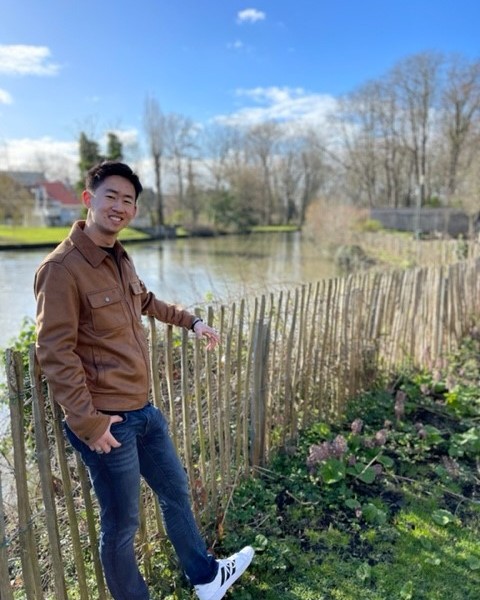
What’s your Fulbright research project?
I’m developing pediatric solid tumor organoid co-culture systems for tailored therapy at the Princess Maxima Center for Pediatric Oncology in Utrecht, Netherlands. (Daniel was the recipient of a special Netherlands Pediatric Cancer Research Award.)
What’s a typical day like for you?
I bike to the Princess Maxima Center and work in the research laboratory from around 8:30am to 5:30pm. By 6pm I’m back at my apartment either cooking dinner or grabbing food with friends. On the weekends, I’ve been trying to visit different cities in The Netherlands or other countries in Europe! So far I’ve been to Belgium, Germany, Sweden, Hungary, and the UK.
What are you doing for community engagement?
Every Wednesday I go to Utrecht’s Language Café, a bar where residents come together to practice different languages. I’ve been going there to practice my Dutch and make new friends! At the Princess Maxima Center, I’ve joined the Science Planning Committee to help organize exciting institute-wide events to bring together all facets of the Institute—researchers, clinicians, and patients/families. In particular, I’ve helped foster the Master’s students’ community and am in the process of organizing the first annual “Week of Science.”
Any advice for future Fulbright research applicants?
Starting early is really key! In particular, coordinating the Letter of affiliation is usually the toughest part of the application. In this regard, reaching out to your UROP supervisor or other professors in classes is a really good starting in point. Most professors at MIT are very well-connected and can help point you in the right direction. As for the essays, it is important to find a diverse group of people to review your essays – especially for the statement of grant purpose since the selection committee has people from all fields of study (the humanities, arts, biology, physics, etc.)
What have you gained from the Fulbright experience?
The Fulbright has been an incredible period of growth – both scientifically and personally. Personally, moving to a completely different country is a challenge in itself, having to adjust to a completely new culture/customs while knowing very few other people in the beginning. However, I’ve found that it is only by placing myself in these “new and unfamiliar situations” that allow for the greatest opportunity for self-reflection and personal growth.
Scientifically, being able to experience a completely different approach to science has been extremely rewarding. Moving forward, I’ll be attending an MD/PhD program with the long-term goal of leading my own research laboratory. Participating in the Fulbright has solidified this desire of mine to become a physician-scientist and also reinforced the importance of fostering diverse interdisciplinary collaborations.
Anything else you’d like to share?
It can sometimes feel intimidating applying to fellowships such as the Fulbright – with so many applicants, and few being selected. That being said, I highly encourage you to give it a shot! Even just going through the entire application process is very helpful and sets you up with the right framework for future essays you may have to write, such as for graduate or medical school applications.


